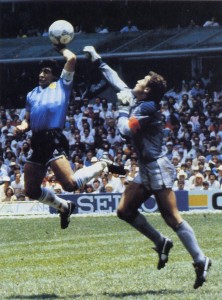Say Hola To South America’s Rodney Dangerfield
July 20, 2011 - 1:03 am by Matthew GleneskTo the unknowing, South American soccer is confined to Brazil and Argentina.
For many, it’s easy to overlook the small nation sandwiched in between the two footballing powers.
But do so at your own risk.
Tiny Uruguay, a country of just 3.5 million people, currently reigns as the kings of South America. And that’s regardless of Sunday’s Copa America final, in which La Celeste will meet the winner of tonight’s Paraguay-Venezuela semifinal (if it’s Paraguay then Sunday’s final will feature some Guay-on-Guay crime. One could only hope it’s more pleasing to the senses than Richard Simmons vs. Lance Bass sounds).
But back to Copa America.
Brazil is gone. As is Argentina. Uruguay saw to it personally in the Argentinian case.
Couple this month’s results with Uruguay’s run to the semifinals in last summer’s World Cup, where they were the final South American side standing, and it’s hard to argue who is top dog in CONMEBOL.
Sure Brazil is 5th and Argentina 10th in FIFA’s world rankings, while Uruguay is 18th. But FIFA’s rankings are nearly as warped as the BCS. Norway, a team which hasn’t qualified for a World Cup since 1998 is ranked 11th. Unless you freeze the field and give them brooms, I’m not real high on the Norwegians.
You can’t argue with Brazil’s history and its five World Cups. But Brazil hasn’t really been Brazil of late. Much of that had to do with Dunga’s abandonment of Brazilian flair. He’s gone and new coach Mano Menezes will go through a transitional period, which will have its hiccups as evidenced by the Samba Boys’ early Copa America exit.
Argentina has the world’s best player in Lionel Messi and Carlos Tevez, who despite his chromosomely-challenged appearance, is not too far behind. But it only takes one lunatic to bring the whole house down (i.e. Diego Maradona).
Uruguay and Argentina have won the same amount of World Cups (two). And yes, Uruguay hasn’t won one since 1950, but Argentina won one of its with a little help from God, or a cheating virtuoso who would later become soccer’s version of Charlie Sheen.
So that’s a wash.
Yet Uruguay still gets no respect. An example for you: A group of friends and I were playing a road trip-induced trivia game on someone’s high tech phone. The question: Who won the first World Cup? I immediately answer ‘Uruguay.’ My buddy says ‘Italy.’ The phone, obviously not a Smartphone, comes up with Italy too. Outraged, I declare shenanigans. One of my good friends from college is Uruguayan and he made damn sure I was aware of Uruguay’s 1930 World Cup victory. I mean the country not only won the first World Cup, it freaking hosted it.
Minor slight there.
In total, Uruguay has won 19 official titles, sharing the record for most international titles by a country with neighboring Argentina. They’ve got two World Cups, two Olympic golds and on Sunday shoot for their 15th Copa America title. (They won something called the Mundialito, or “Little World Cup,” in 1980, which was a one-time, 7-match tournament with Italy, West Germany, Argentina, Holland and Brazil. You know, only the best soccer countries in the world.)
Uruguay has always been known for its rugged defensive play. Heck, much of it bordered on dirty. La Celeste always had the grit and spine, but now a trio of offensive superstars has reinvigorated this once proud soccer nation into a force yet again.
Brazil has its stars, and Argentina theirs.
But you’ll be hard pressed to find a more prolific trio in the world than Diego Forlan, Luis Suarez and Edinson Cavani.
Forlan’s ineffective spell at Manchester United is well-documented, but his scoring exploits in La Liga surely put to rest any question of the striker’s quality. Since arriving in Spain, Forlan has netted 128 goals in 240 games and won the European Golden Boot twice.
Equally prolific is his national team strike partner, Suarez. In 2010, Suarez scored 49 goals in all competitions for Dutch giants Ajax before joining Liverpool. The 24-year old had a breakout party at the 2010 World Cup and is poised to make the Anfield faithful forget about Fernando Torres.
Cavani exploded last year at Napoli, breaking the club’s record for most Serie A goals in a single season with 26, and was just off the pace of Antonio Di Natale’s league-leading 28 goals.
Uruguay’s firepower would give General Patton a chubby. In fact, I can already see the Bulge.
Sunday’s Copa America final gives Uruguay a chance to add another major title to its dusty trophy case. How long this golden generation lasts is hard to say. Forlan is 32, and captain Diego Lugano is 30. So I’m going to enjoy the ride while I can. Let’s just hope “Sweating to the 80s” doesn’t make a cameo.




